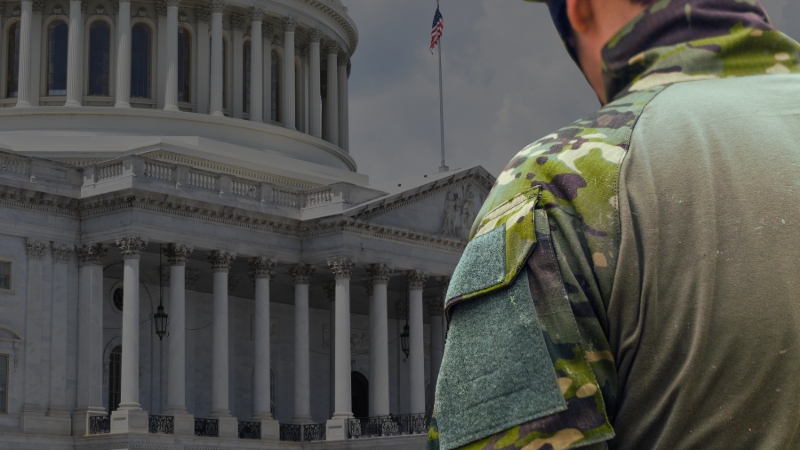Joining the U.S. military is a serious commitment. For anyone carrying a felony conviction, the process can feel like an uphill climb, even after receiving executive forgiveness. A pardon can open doors, but it does not sweep away the record for purposes of military enlistment.
Recruiters, Military Entrance Processing Stations (MEPS), and waiver authorities all look beyond the paperwork to the underlying conduct.
We prepared a practical guide drawn from federal statutes, Defense Department instructions, and current service regulations to help you see what actually happens when a pardon meets the enlistment process.
Key Points
- A pardon signals rehabilitation but does not erase a felony for military enlistment, so disclosure is still required.
- All felony cases remain in the waiver process under 10 U.S.C. § 504 and DoD rules.
- Restored firearm rights can remove federal bars, but do not guarantee access to combat or clearance-required jobs.
- Strong documentation, candor, and a clean post-offense record greatly improve waiver chances.
Why Pardons Matter for Military Applicants

A pardon can feel like a fresh start. In civilian life, it can restore voting rights, eligibility for certain licenses, or the ability to hold public office.
For military accession, however, it signals rehabilitation rather than erasure. The services still must ensure that recruits meet statutory and regulatory conduct standards. In plain terms, a pardon strengthens your case but does not guarantee admission.
Key Definitions at MEPS
Before looking at how a pardon interacts with military rules, it helps to see how terms are defined for accession purposes.
Term
What it Means in the Military Context
Pardon
Executive forgiveness for an offense. The conviction remains visible to federal checks. It restores some rights but does not expunge or delete the record.
Expungement or Set-Aside
Court-ordered removal or nullification of a conviction. Civilian employers may treat this as a clean slate, but the Department of Defense still evaluates the underlying behavior for enlistment.
Sealing
Restricts public access to a record. Federal background checks for military applicants often bypass seals, especially for juvenile cases.
The Federal Rule You Need to Know: 10 U.S.C. § 504
10 U.S.C. 504, any person who is a convicted felon is prohibited from enlisting in any military service. Then anyone who is a convicted felon should be prohibited from being Commander-in-Chief of our military. @SenSchumer @AOC @RepJeffries
— john lizzi (@johnlizzi) June 13, 2024
Federal law sets the baseline. Under 10 U.S.C. § 504, anyone convicted of a felony cannot enlist without the Secretary of the military department granting an exception in a meritorious case.
The Department of Defense repeats this standard in its accession regulation at 32 C.F.R. Part 66. In practice, that means felony cases live in the waiver world.
The Defense Department’s Instruction 1304.23 also directs the services to collect criminal history from self-disclosure and official checks during recruiting. If you’ve received a pardon, you still have to reveal the conviction. Hiding it can itself be disqualifying.
How Pardons Interact with Military Accession Rules
Each branch applies the federal baseline through its own accession manuals and waiver processes. Here’s how the main policies line up.
Army
The Army’s enlistment regulation states that a conviction later subject to expungement, amnesty, pardon, or clemency still counts as a conviction unless the charges are dismissed or the person is acquitted on retrial.
In other words, a pardon by itself does not erase the need to address the offense in your enlistment file. A waiver is typically still required.
Department of the Air Force (Air Force and Space Force)
Air Force and Space Force recruiting manuals categorize offenses into tiers with specific waiver authorities.
The structure confirms that adverse adjudications, including serious offenses, need waivers decided by designated commanders. The manuals do not treat a pardon as automatic clearance.
Marines, Navy, and Coast Guard

Although the format differs, each service uses the same statutes and Defense Department rules.
Coast Guard recruiting policy cites the criminal-history acquisition instruction and applies a standard suitability review.
Applicants with pardons should expect case-by-case waiver decisions rather than a blanket pass.
DoD-Wide Standards
DoDI 1304.26 establishes uniform accession standards. It requires applicants to meet moral and conduct benchmarks but leaves room for service-level waivers.
A pardon can be a positive equity, but it does not automatically meet the underlying conduct standard.
Honesty Is Required
At MEPS and throughout accession processing, applicants complete USMEPCOM forms and undergo interviews. Defense Department policy requires obtaining criminal history information by self-disclosure and official checks.
Separate training guidance warns officer candidates that sealed or expunged records can still appear in federal checks.
The safest rule is to disclose everything, including pardoned or expunged events. Failing to do so can block your enlistment outright.
Some applicants also work with services like Guaranteed Removals to address outdated or harmful online records before approaching a recruiter.
Firearm Rights, Domestic Violence, and Combat Jobs

- 18 U.S.C. § 922(g)(1) bars firearm possession by anyone convicted of an offense punishable by more than one year.
- 18 U.S.C. § 921(a)(20) says you are not considered convicted for federal firearms purposes if the conviction has been expunged, set aside, or pardoned, or you have had civil rights restored, unless the relief order still restricts you.
- 18 U.S.C. § 922(g)(9) bars firearm possession for a misdemeanor crime of domestic violence. Section 921(a)(33) contains a similar carve-out for expungement, pardon, or restoration of firearm rights, again subject to the order’s conditions.
But even with firearm rights restored, the services still review the underlying conduct and may still require a waiver.
Security Clearances and MOS Options
Many enlisted and officer specialties require eligibility for a national security clearance. Clearances are adjudicated under SEAD-4’s National Security Adjudicative Guidelines, which evaluate conduct, rehabilitation, candor, and risk under a whole-person standard.
A pardon can be a positive mitigating factor, but adjudicators may still consider the underlying behavior and your honesty in disclosure. A pardon does not guarantee clearance eligibility, though it can help.
Offenses That May Not Be Waivable
View this post on Instagram
DoD policy and service rules reserve certain offenses as non-waiverable or requiring the highest levels of approval. Sexual offenses and specific violent crimes generally sit at the hardest end of the spectrum.
DoDI 1304.26 sets the uniform conduct baseline, and each service publishes detailed offense tables showing which categories can be considered and by whom. Expect limited or no waiver options for the most serious offenses.
The Numbers Behind Waivers
Conduct waivers have been part of the recruiting system for decades. During the mid-2000s recruiting crunch, the Government Accountability Office reported that about 12 percent of new active-duty Army recruits in fiscal year 2008 had conduct waivers.
More recently, public reporting showed the Army approved 401 felony waivers in 2024, up from 98 in 2022. Those data points do not predict any single case, but they show waivers remain an active tool.
How a Pardoned Felony Plays Out Step by Step
Step 1: Recruiter Pre-Screen and Self-Disclosure
You disclose all criminal history, including pardoned or expunged matters. Recruiters use that information to pre-screen whether your case requires a conduct waiver.
Step 2: MEPS File Build and Background Checks
MEPS packages the file and confirms the history. Even records you believe are sealed may appear in federal checks, which is why full disclosure is crucial.
Step 3: Waiver Determination
If the offense is disqualifying, the service decides whether to seek a waiver. The felony bar in 10 U.S.C. § 504 means your case needs a meritorious exception.
The decision looks at severity, time since offense, pattern, rehabilitation, education or service potential, references, and whether any firearm disability remains.
Step 4: Job Matching
Even with an enlistment waiver, certain specialties may be off the table if they require firearm access you still lack, or a clearance you cannot obtain at that time.
Practical Scenarios
Scenario
Criminal Record Status
Firearm Rights under Federal Law
Waiver Likely Needed?
Notes
Full pardon, no expungement
Conviction remains on record with a pardon entry
Often restored under 18 U.S.C. 921(a)(20), unless the pardon limits firearms
Yes for felony cases under 10 U.S.C. 504
Shows rehabilitation but still needs disclosure and waiver.
Expungement or set-aside, no pardon
Court record cleared or nullified
Often treated as not convicted for federal firearms, subject to state law and order language
May still be required depending on service rules
Do not assume the military will ignore the behavior. Disclose.
Pardon plus expungement
Cleanest legal posture
Typically restores federal firearm eligibility unless the order says otherwise
Still case-by-case; felony statute still points you into waiver lane
Strong evidence of rehabilitation but not an automatic pass.
Domestic-violence misdemeanor, later pardoned
Conviction remains with a pardon entry
922(g)(9) bar is lifted if pardoned or expunged unless the order restricts firearms
Conduct evaluation still applies
Expect careful review for any job requiring weapons or clearance.
Documentation Checklist That Actually Helps
- Certified copies of the conviction, judgment, and docket, plus the executive pardon certificate, and any court orders granting expungement or set-aside.
- Proof of restored firearms rights, if applicable, is tied to the exact language in the pardon or court order.
- Character letters, proof of employment, volunteer work, treatment completion, or professional licenses.
- A short factual statement that takes accountability and shows sustained rehabilitation. Whole-person reviews value honesty and pattern change.
FAQs
A Realistic Path If You Already Have a Pardon
- Talk to a recruiter and bring everything. Show the pardon, court orders, and any paperwork that proves restored rights. The recruiter will pre-screen under DoDI 1304.23’s criminal-history guidance.
- Be completely candid at MEPS. Inconsistent disclosure is a common reason for delays or denials. The process is designed to capture the full record.
- Expect a waiver packet. Because of 10 U.S.C. § 504, felony cases live in waiver territory. Your packet should highlight the time since the offense, a clean record since, work and school performance, service references, and the pardon itself.
- Aim for realistic job choices. If a specialty needs a clearance, your candor and rehabilitation plan matter under SEAD-4. If a job requires firearms, make sure your rights are legally restored under sections 921 and 922.
The Bigger Picture

Pardons remove legal disabilities and can open doors. They do not delete the past for military accessions.
The law still routes felonies into waiver processes, the Defense Department still requires disclosure and background checks, and the services still weigh the conduct and your present-day reliability.
The system also adapts to manpower conditions. In tight recruiting years, services use more waivers. In stricter years, fewer. The GAO’s 2008 snapshot and 2024–2025 reporting show how those levers move.
A well-documented pardon can strengthen your case, especially when paired with clean years, stable work, strong references, and clear restoration of rights. It is not automatic entry, but it is real progress toward a waiver and a uniform.







